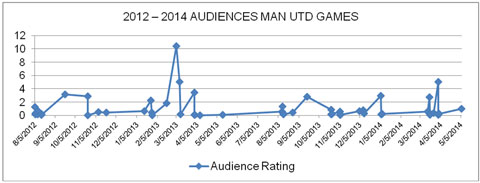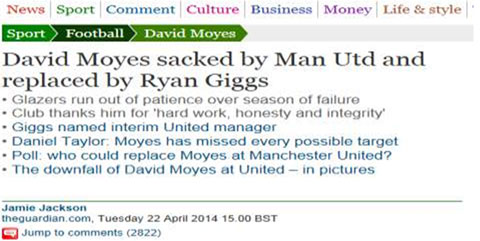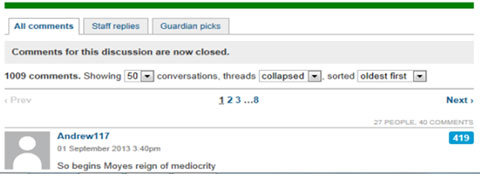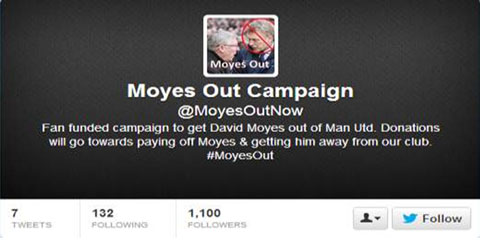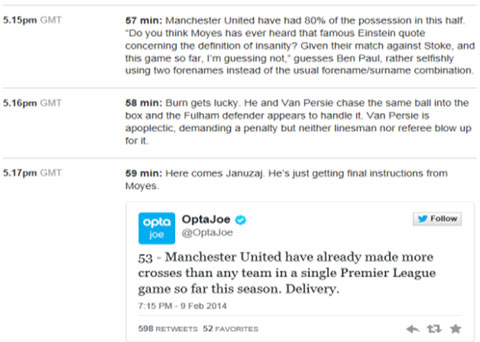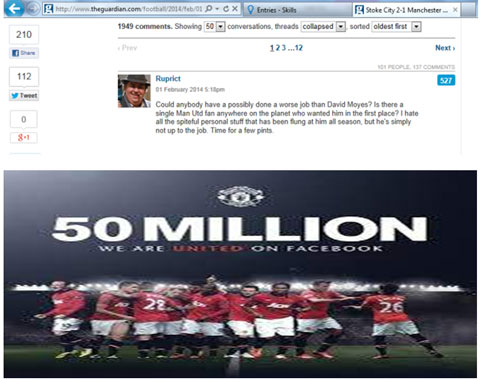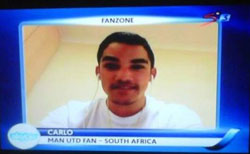Those who know me well will know that I'm a Manchester United fan and I'm a media strategist by trade.
I'm combining my two passions to try to get an understanding of whether television is still the main medium for viewing football... To do that let's get into the psyche of a football supporter:
It's been very easy to support Manchester United since the start of the Premier League era as they've been very successful, so much so that it's become more trendy over the years to 'love to hate' the club. You'll see as you read the piece that this is a word that appears regularly because as people that's what we tend to do, follow what everyone else is doing.
So in the early to mid-'90s it was trendy to support Manchester United and that's how they built up a global following of millions.
If we go back 12 months, the club had just secured a record 20th English Premier League title, and that signalled the end of a dynasty, Sir Alex Ferguson had finally decided to retire.
As with anything trending, you're always going to have people who adopt it quickly, like most social networks, after which, you'll get those people who catch on because the influencers have given it a positive recommendation.
In terms of audiences, football - if you didn't already know - is huge in Africa and the English Premier League has a very large, very loyal following.
In South Africa, by standards of any country who deem themselves diehard followers of the sport of football, we have a very poor match attendance culture, which helps to explain to some degree the appetite for the overseas content.
We prefer to sit at home or have friends over for major sports events. The anomaly of course being the 2010 FIFA World Cup hosted in this country, but as mentioned, this is not the norm.
In general, we just do not go to live football games in South Africa; a possible reason for this is that the fans of the English/European football have a high expectation for the general quality of the football they watch, one that can't often be met by South African clubs (or the national team to be honest).
Exceptions such as the Soweto derby between Kaizer Chiefs and Orlando Pirates do occur, but then again those two clubs have the largest fan base in the country.
According to SuperSport and AMPS, football is the most watched sport in the country with the English Premier League reaching over 40 million South Africans (All Adults 15+) over the space of a 10 month season.
If we look at the data, you will see on the graph below that 2012/2013 season had higher total viewership for the selected Manchester United fixtures, whilst in 2013/2014 the audience declined by 18%.
It's easy to deduce that people simply lose interest in Manchester United.
Manchester United lost 10 of their first 31 league matches; they were knocked out of domestic cups early. Hence the interest from a fan perspective will have subsided more so than in seasons when the club was chasing trophies.
The peak in April 2014 will have been caused by the fact that David Moyes was eventually relieved of his duties and club legends Ryan Giggs, Paul Scholes, and Nicky Butt were installed in his place as a temporary solution until the end of the season.
The CEO of the English Premier League has even admitted that the popularity of English Football will decline if Manchester United doesn't recover from last season's slump.
Having said that remember, I mentioned that this is not specific to sport or football, it's just the way trends work: Mxit was once the main mass-market instant messaging application but has since been overtaken by newer more user-friendly options like WhatsApp.
So the TV data says audience numbers have declined, fair enough but what I can categorically state is that in New Media, Manchester United have never "trended" the way that they have in the past 12 months: I can still remember one of the comments on the article confirming David Moyes as the new Manchester United manager - "MOYES OUT!".
He hadn't even taken up his new role yet. By the end of 2013, Manchester United and David Moyes had become the laughing stock of social media. Some post match reports on popular sites such as The Guardian.co.uk would reach over 1,000 comments, within an hour! This became "the trend" of the season.
As much as the TV audience figures locally may have declined, they only declined by 18% and one can hypothesis that all of those people who had become tired of watching Manchester United winning everything watched in their droves to see the slow and televised decline of a global superpower, it made for good TV if you weren't a Manchester United supporter.
Further to that, in light of the way that new media works these days, television is definitely not the medium it once was.
In South Africa, PVR and the prominence of network providers with uncapped data options has made it very easy to get content of any variety online through and thereby changing viewership behaviour.
In the context of football an example of this is live streaming and even something as simple as a ''Minute By Minute'', ''Live Match Report'' on mobisites or website. We all know that today's consumers especially the younger audiences are constantly on the move, so media needs to adapt to account for this and many touch points and platforms have done exactly this.
We know that young consumers are on different devices (TV, PC/Tablet/Smartphone) at the same time and this is a perfect example of how they can work together. They're reading a report, whilst streaming the game, whilst tweeting and retweeting but engagement and interactivity is the key insight here. One MBM (Minuted By Minute) that immediately jumps to mind as a case study is the Manchester United vs Fulham below:
So audiences are shifting to new media spaces (Facebook, Twitter, IM, Instagram) and here it's clear to see that the Manchester United audience grew astronomically, which is in converse of what's happening on our local TV's.
Most of it was negative but ultimately it was publicity and regardless of a poor 12 months in terms of results, it still remains one of the biggest clubs globally.
Many of the partners who have aligned themselves to the brand to grow their own brand equity need not worry.
Closer to home for me, Chevrolet have recently taken up a 500 Million Pound sponsorship and internally alarm bells may have started ringing as results became worse week on week.
The club will continue to be in the public's eye so I strongly think General Motors' investment is safe with a brand like Manchester United, even during their worst season in decades they continued to be the topic of conversation in touch points that allow for exactly that - conversation.
Interestingly, the English Premier League as part of their content offering has an interactive TV show called Fan-Zone that's broadcast out of the UK but a relatively conservative estimate would suggest that at least 50% of the people who either email, Skype or call-in come from Africa and at least 50% of that would be South African.
Therefore it is my opinion that globally the trend is that consumers are increasingly switching from traditional modes of sport consumption to new media touch points that allow for them to voice their opinions.
Television still has a role to play in less developed markets like Africa and South Africa and even in developed markets, broadcasters are following consumer trends by providing platforms where consumers can voice their opinions.
Local advertisers who have always focused on television can rest in the knowledge that the audiences are still there, they just need to follow consumer trends and understand that viewership behaviour is changing, content and engagement has become the key.
[This opinion piece comes at a time when the SABC has reportedly just lost its rights to live coverage of Bafana Bafana games: SABC loses rights to live Bafana games...
Live Bafana Bafana matches are about to disappear from the SABC after pay-TV newcomers Siyaya TV won exclusive radio and television rights to all South African national football teams in a six-year broadcast deal worth R1bn.
Subsequently, however, the SABC denied it had lost the rights in question - see The SABC and rights to live BB games: Yes? No? - Editor]

















































